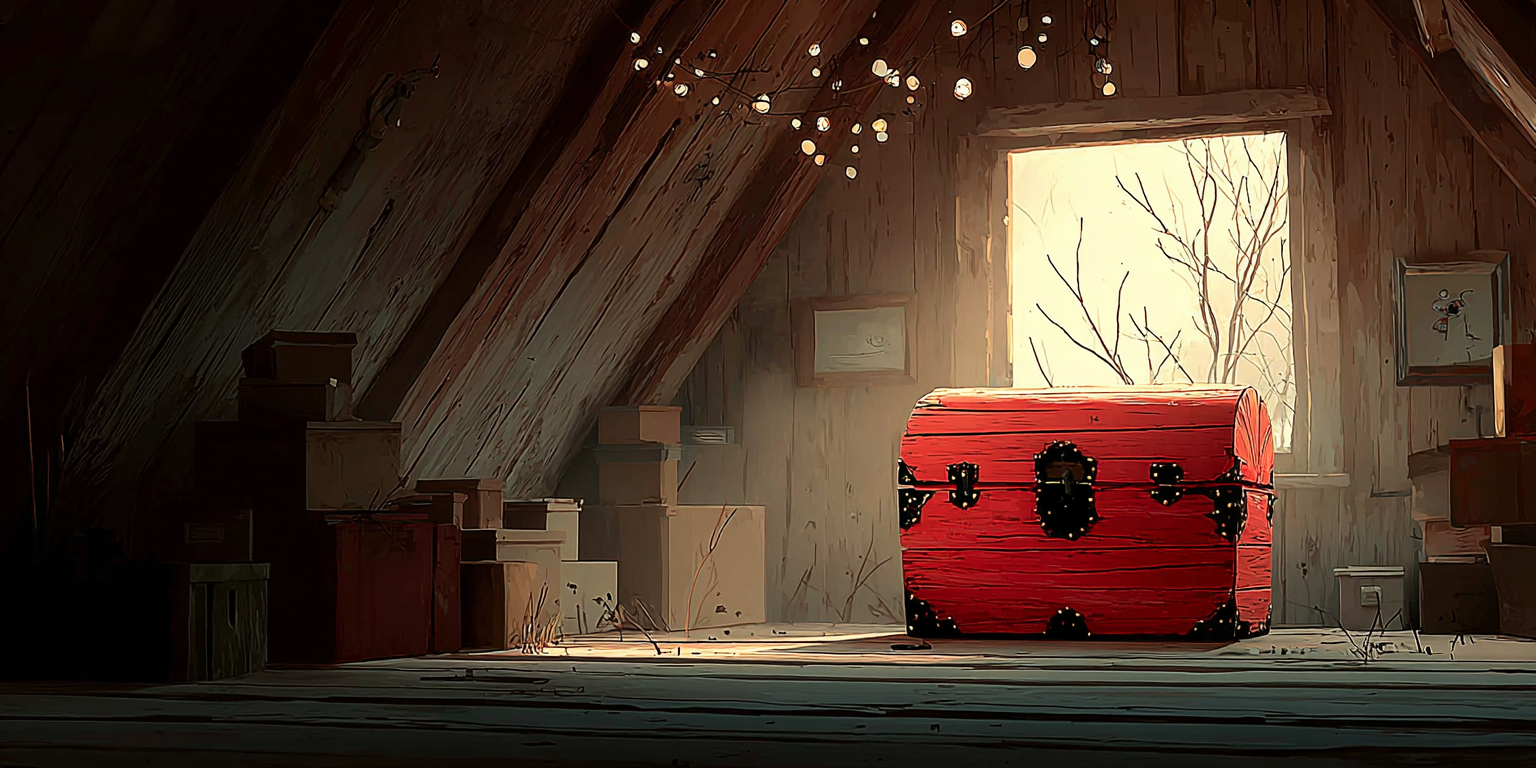“Chest” means “the front part of your body” or “a big strong box.”
「chest」は「胸」や「大きな箱」という意味を持つ。
以下は英単語 “chest” に関するストーリー型学習コンテンツです。まずは大枠の意味を理解して最後の文章で確認しましょう。
主な意味(main meaning)
| 品詞 | 意味 | 発音記号 | 例文 |
|---|---|---|---|
| 名詞 | 胸、胸部 | /tʃɛst/ | He put his hand on his chest and took a deep breath. |
| 名詞 | 箱、収納箱(特に大きくて丈夫な箱) | /tʃɛst/ | She kept her old letters in a wooden chest. |
語源(etymology)
「chest」は古英語 cest(箱)から来ており、さらにラテン語 cista(箱)が語源。
核心イメージは「中身を入れる場所」。そこから「胸(心臓や肺を入れる場所)」や「箱」につながった。
類義語(synonyms)
| 類義語 | 意味 | 例文 |
|---|---|---|
| breast | 胸(特に女性の胸) | She held the baby close to her breast. |
| trunk | 胴体、または大きな箱 | He packed his clothes into a large trunk. |
| box | 箱 | He opened the box to see what was inside. |
| torso | 胴体 | The statue showed the torso of a man without arms or legs. |
反義語(antonyms)
| 反義語 | 意味 | 例文 |
|---|---|---|
| back | 背中 | He turned his back to the audience. |
| open space | 開けた場所(中身を入れるものの反対イメージ) | We walked into an open space with no trees. |
コロケーション(collocations)
| コロケーション | 例文 |
|---|---|
| chest pain | He went to the hospital because of chest pain. |
| treasure chest | The pirates found a treasure chest on the island. |
| ice chest | We brought drinks in an ice chest to the picnic. |
| chest of drawers | She kept her clothes in a chest of drawers. |
2項表現(binomials)
| 2項表現 | 例文 |
|---|---|
| chest and back | The doctor checked his chest and back carefully. |
| box and chest | The attic was full of an old box and chest. |
英語ストーリー(english story)
Story: “The Old Chest in the Attic”
When Tom’s grandmother passed away, he was asked to clean the attic of her old house. The attic was full of dust and cobwebs, and in one corner, he saw a large chest. It was made of wood and had an old lock on it. Tom touched his chest with his hand as he took a deep breath, feeling both excited and nervous.
He pulled the heavy chest into the middle of the attic. At first, he thought it was just like an ordinary box, but soon he noticed something special. On the side, there were old letters carved into the wood. He remembered his grandmother used to tell him stories about a treasure chest hidden in the family. Could this be it?
With some effort, he managed to open it. Inside, there were not only clothes and books but also an old photo album and a chest of drawers in miniature size. Tom laughed, thinking it was a strange thing to keep inside a box.
Suddenly, he felt a sharp chest pain. He sat down and put his hand on his breast, trying to calm down. He realized he was just too excited, and his heart was beating fast. After a while, he felt better and looked again at the chest’s contents.
Among the things, he found another small trunk filled with letters from his grandfather. They were love letters, written during the war. Tom read one of them and felt his heart warm. He thought about how his grandmother must have kept these in a safe place, close to her torso, and then finally stored them here.
He looked around the attic. On one side was the chest, on the other side was open space with nothing at all. The difference between the chest and back of the attic felt symbolic: one side full of history, the other side empty.
Finally, Tom carried the letters downstairs. He wanted to share them with his family. The old chest would no longer just sit in the attic. It would become a treasure for everyone to remember the past.
和訳
祖母が亡くなったとき、トムは古い家の屋根裏部屋を片づけるよう頼まれた。屋根裏部屋はほこりとクモの巣でいっぱいで、その隅に大きな**chest(箱・胸)があった。木でできていて、古い錠前がついていた。トムは自分のchest(胸)**に手を当て、深呼吸をした。わくわくと不安の両方を感じていた。
彼は重い箱を部屋の真ん中に引き出した。最初はただの**box(箱)だと思ったが、すぐに特別なものだと気づいた。側面には古い文字が彫られていた。祖母が家に隠されたtreasure chest(宝箱)**の話をしてくれたことを思い出した。もしかして、これがそうなのか?
彼はなんとか開けることに成功した。中には服や本だけでなく、古いアルバムや小さな**chest of drawers(タンス)**の模型まで入っていた。トムは、箱の中にタンスがあるなんておかしいと笑った。
突然、鋭い**chest pain(胸の痛み)を感じた。彼は座り込み、自分のbreast(胸)**に手を当てて落ち着こうとした。単に興奮しすぎて心臓が早く打っていただけだった。しばらくして落ち着くと、再び中身を見た。
中にはさらに小さな**trunk(トランク・箱)**があり、そこには祖父からの手紙が詰まっていた。それは戦争中に書かれたラブレターだった。トムはそれを読み、心が温かくなった。祖母がこれを大事にし、体(torso(胴体))の近くにしまい、最後にここへ置いたのだろうと思った。
彼は屋根裏部屋を見回した。片方には箱があり、もう片方は何もない**open space(開けた場所)だった。屋根裏部屋のchest and back(前と後ろ)**の違いが象徴的に思えた。一方には歴史が詰まり、もう一方には空虚があった。
最後に、トムは手紙を階下へ運んだ。家族と共有したいと思ったのだ。古い箱はもう屋根裏で眠ることはない。みんなで過去を思い出すための宝物になるのだった。
Q&A
Q: 「chest」と「breast」の違いは?
A: 「chest」は胸全体(心臓や肺を含む胸部)を意味し、男女どちらにも使います。「breast」は特に女性の胸(乳房)を指すことが多いです。
Q: 「chest」と「trunk」の違いは?
「trunk」は旅行用の大きなカバンや荷物入れのイメージが強いです。また「trunk」には「胴体」という意味もあります。
Q: 「chest」と「box」の違いは?
A: 「box」は一般的な箱を広く指す言葉です。紙箱、段ボール、小さな箱など、形や素材に関係なく使えます。「chest」は大きくてしっかりした箱を指すことが多いので、ニュアンスが異なります。
Q: 「chest」と「torso」の違いは?
A: 「torso」は胴体全体(首から下、腰までの部分)を意味します。「chest」はその中でも特に前面の胸部を指すので、範囲が狭いです。
コロケーションの違い
Q: 「chest pain」と「back pain」の違いは?
A: 「chest pain」は胸の痛みを指し、心臓や肺に関係する可能性があります。「back pain」は背中の痛みを意味し、筋肉や姿勢に関わることが多いです。
Q: 「treasure chest」と「safe」の違いは?
A: 「treasure chest」は海賊の宝物が入っているような大きな木の箱を指し、冒険的・物語的なニュアンスがあります。「safe」は金庫のことで、銀行や家庭で貴重品を守るための現代的なものです。
Q: 「ice chest」と「refrigerator」の違いは?
A: 「ice chest」は持ち運びできるクーラーボックスで、氷を入れて飲み物などを冷やします。「refrigerator」は電気で冷やす家庭用の冷蔵庫です。
Q: 「chest of drawers」と「closet」の違いは?
A: 「chest of drawers」は引き出しのついた家具で、服や小物を入れます。「closet」は壁に作り付けられた収納スペースで、ハンガーで服をかけたり、大きな物をしまうのに使います。



コメント